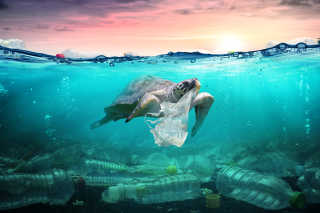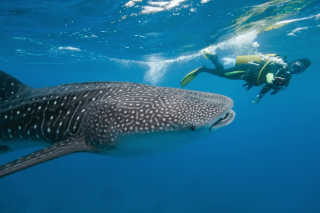How to be a responsible tourist: Under the sea
It is easy to be a tourist, the challenge comes in being a responsible one!
If you are travelling to countries that offer underwater activities like diving and snorkelling, read on for our under the sea edition on how to be a responsible tourist - see the world and save it at the same time.
- 1. Do not litter
- 2. Respect the ocean
- 3. Be a sustainable shopper
- 4. Use reef-safe sunscreen
- 5. Choose responsible dive operators
1. Do not litter

As we all know, the ocean has long born the brunt of suffering brought about by both climate change and man’s habits. Perhaps the easiest thing that we can do to help out is to not litter while exploring these water bodies. Marine pollution is sadly an environmental issue that has plagued both the ocean and the marine wildlife that depend on it. We all remember the heart-wrenching images of fishes and birds choking on our plastic straws and styrofoam bits.
As the sizes and shapes of these trash pieces closely resemble food bits (plankton, smaller fishes) these gentle creatures eat, they are sadly unable to distinguish what is food and what isn’t. As a result, they end up stuffing their stomachs with our rubbish - plastic and styrofoam that they are unable to digest. Eventually, they die from starvation or intestinal blockage.
TLDR: Just follow the rules of Singapore's ‘fine city’ and do not litter wherever.
2. Respect the ocean
While you wish for a memento of your unforgettable diving experience in the deep blue sea, do remember to respect the ocean and to not remove any coral or marine wildlife from their natural habitats. Many might not know, but several corals and marine wildlife species are classified as ‘endangered’ under the Endangered Species Act. Under this law, many nations deem it a criminal offence should you be found in possession of this wildlife.
Besides legal reasons, it is more important for travellers to understand that every coral and animal is indeed an irreplaceable member of the delicate marine ecosystem. For instance, coral reefs are home to up to hundreds (and sometimes thousands) of marine species. Take away these reefs and these animals will be increasingly exposed to their natural predators or forced to live in unsuitable living conditions - tipping the balanced scale of the marine ecosystem.
TLDR: ‘Take only pictures, leave only bubbles’.
3. Be a sustainable shopper
As most diving/snorkelling spots are at well-known beaches or resorts, you can bet that there would be a shop or two selling souvenirs. Though you might be tempted to buy that beautiful coral or sea turtle shell jewellery, please do not.
To resell these items as souvenirs, corals, shells and other wildlife are first collected from the ocean. They are then later reshaped and preserved as trinkets. Therefore, it is easy to see that if you do purchase these souvenir items, you ultimately still play a hand in removing these species from their rightful natural habitat.
Plus, when there is demand, sellers will seek to either maintain or increase supply. Henceforth, you might just be encouraging these establishments to continue harming these marine populations for their profit.
TLDR: Do not buy items that resemble marine life. If unsure, feel free to check with the store owner or local guides.
4. Use reef-safe sunscreen

When heading out to the beach or even for outdoor activities, it is always wise to apply sunscreen to avoid sunburns and peeling skin. However, did you know that chemicals found in sunscreen kill or bleach coral? This happens as the run-off from sunscreen when we are in the water possesses toxic chemical compounds that either accelerate coral bleaching, damage coral DNA or even threaten coral reproduction.
Sadly, no sunscreen is 100% harmless to coral and marine life, but we can still look out for brands that do not use ingredients that have been scientifically proven to be more toxic than others. Oxybenzone Octinoxate is the top ingredients to avoid - opt for sunscreens that are ‘Oxybenzone-free’. Water-resistant sunscreen brands are recommended since lesser ingredients and compounds will be washed into the ocean.
Alternatively, you can try to reduce the amount of sunscreen you apply by investing in quality sun protective clothing and diving suits with a UPF rating. This way, the clothing can prevent sun rays from penetrating the fabric.
TLDR: Apply your sunscreen 15-20 minutes before going into the water to ensure that the lotion is absorbed in your skin, thus reducing the amount being washed away.
5. Choose responsible dive operators

Regrettably, the cause of eco-tourism is not supported by all. As such, you might encounter unfavourable dive operators that use irresponsible diving practices like mindlessly dropping anchors and thus, damaging coral reefs. When there is a demand, there will be supply.
To ensure that sustainable tourism will grow to be a norm rather than a novelty, divers and tourists should show their support and engage with responsible dive operators instead. These operators could be working towards goals like ocean conservation, minimal reef impact and stainable tourism.
When you ready to look for that next great airfare deal, be sure to compare our best flight prices on BudgetAir.co.uk.